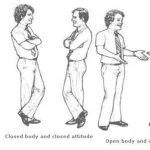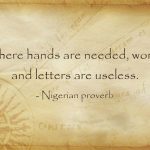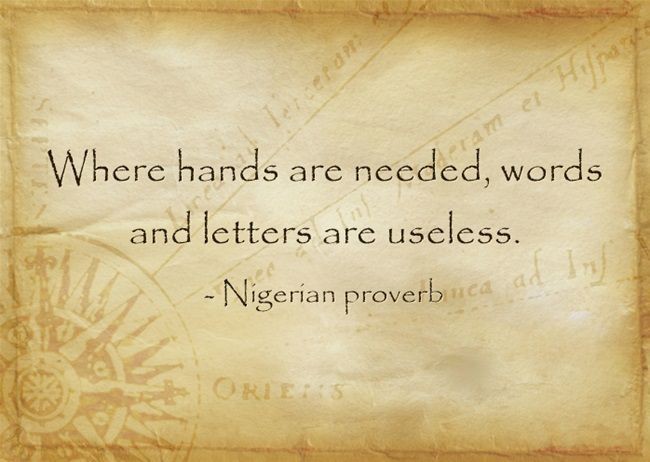In Nigeria, when the elders are discussing with a young person, it is not culturally proper for the younger one to respond with proverbs without giving due respect to the wisdom the elders possess. Yes, across different tribes and cultures, Nigerian proverbs are often associated with experience and wisdom.
This is why in any discussion, an individual who uses the most Nigerian proverbs and can explain their meaning relating to the issue at hand will be said to be the wisest and most experienced.
Of a truth, Nigerian Proverbs are interesting to hear and are deeply meaningful despite how funny some of them may sound. What are some of these Nigerian Proverbs and their meanings? You’ll find out in this article.
Table of Contents
10 Nigerian Proverbs and Their Meanings
In the bank of Nigerian Proverbs that have been in existence before the birth of many of us, some of them with lessons we all can learn from are:
-
Proverb 1
Even if a goat frowns its face, it cannot lack a buyer in the market.
Meaning: No matter what a person’s condition, problem, or physical disability is, such a person can still achieve what they want to achieve. A human’s limitation does not hinder their success, so no one should be looked down on because of life’s lemons.
-
Proverb 2
A lion will not give birth to a goat.
Meaning: A child will always look like his parents, one way or the other. It may be in looks, attitude, or behavior. More often than not, when traced, such behavior results from their parents’ actions, qualities, or traits.
-
Proverb 3
Hot anger cannot cook yam or beans.
Meaning: Anger does not solve anything in reality. Fire is used for cooking, be it yam (as hard as it is before cooking) or beans (as long as it takes before it can get ready) or any other meal, so what the proverb means is that no matter how angry a person is, his anger cannot be so hot that it will start cooking a meal, not to talk of cooking to finish.
In essence, it is essential that, as humans, we learn to keep our cool and learn to solve the problems that brought about anger in the first instance.
-
Proverb 4
What an elder sees while sitting down, a young one can never see, even though he climbs the tallest tree.
Meaning: Note that not just ‘a tree’ was mentioned, but the tallest tree. This means that nothing can beat the experience of an older one. This also means that it is essential for younger ones to learn from the experiences and wisdom that older ones have to give rather than make costly mistakes.
-
Proverb 5
He who has no helper must be sensible.
Meaning: The reality about life is that not everyone has the privilege to be born into a rich home or with very wealthy parents. Many must work extremely hard to care for themselves and those who matter to them.
Keeping this in mind will help such ones never to imitate the attitudes of those who have people they can always turn to for help to solve their problems. This also implies that people without someone to help must learn to work hard rather than make excuses because excuses will take them nowhere.
Join our WhatsApp community to access opportunities and resources that will help your growth.
-
Proverb 6
There is no smoke without fire.
Meaning: Every happening has a source; nothing happens without a cause. This proverb is similar to Newton’s third law of motion, which states: To every action, there is an equal and opposite reaction. There is a consequence or reward because something or someone took steps to produce such results.
Nothing happens for nothing; there is a trigger for everything that happens.
-
Proverb 7
One who a snake has beaten gets scared when he sees an earthworm.
Meaning: This is similar to the saying: Once bitten, twice shy. The snake is harmful and can hurt a person deeply, while an earthworm is harmless. However, they have one thing in common: the way they move. They do not have legs, they crawl on their bellies.
The proverb, therefore, means that a person is usually prudent when they have experienced pain in the past due to a decision or something else, so they try to tread carefully so that they will not experience hurt again.
Read also: Top 10 Life Hacks Every Nigerian Youth Should Know.
-
Proverb 8
Trouble was sleeping, and pride woke it up.
Meaning: Even when conflicts arise, humans must learn to be humble and handle such problems rationally rather than “wake trouble up,” stir up problems for themselves, or blow things out of proportion to satisfy their ego.
-
Proverb 9
The wind has blown, and the buttock of the fowl has been revealed.
Meaning: No matter what a bad person does or what a person’s evil deeds are, they will all be revealed one day without fail. This proverb is usually used negatively, especially to mock a person whose dirty secrets have been exposed and who is being ridiculed by many.
Read also: Nigerian Slangs Dictionary
-
Proverb 10
No matter how many pushups a lizard does, it will never be as muscular as the alligator.
Meaning: You are you, so be true to yourself. Trying to pretend to be another person or striving to do everything another does just to be like them is not necessary. You are unique and special in your way. You have what makes you an amazing person, and you are great.
There is no reason to pretend to be who you are not. The only result will be disappointment and heartache. A lizard is a lizard and it can never become an alligator, same way you can’t become someone else.
Conclusion
There is no doubt that there is nothing archaic about Nigerian proverbs. As seen above, they are all relevant to us today, and taking practical lessons from them rather than just using them to show our cultural prowess will be of great help.
If there is anyone that particularly strikes you as important, do mention it in the comment section.
Oluwanifemi Akintomide edited this article.
Subscribe to our newsletter so you won’t miss our latest insightful posts.
About Author
- Stella Agboola is a content creator who specializes in the field of health and disease. She also has a personal blog where she discusses social-related content. In addition, she is an avid reader of domestic thrillers and African novels. At her leisure, she reads books and listen to podcasts for information and entertainment.
Latest entries
 LifestyleNovember 19, 2023Understanding Body Language and Facial Expression – A Simple Guide to Social Intelligence
LifestyleNovember 19, 2023Understanding Body Language and Facial Expression – A Simple Guide to Social Intelligence
 CareerSeptember 14, 2023Video Conferencing Etiquette Tips for Nigerian Employees
CareerSeptember 14, 2023Video Conferencing Etiquette Tips for Nigerian Employees LifestyleSeptember 1, 2023Nigerian Proverbs and Wisdom: Lessons for Modern Living
LifestyleSeptember 1, 2023Nigerian Proverbs and Wisdom: Lessons for Modern Living

